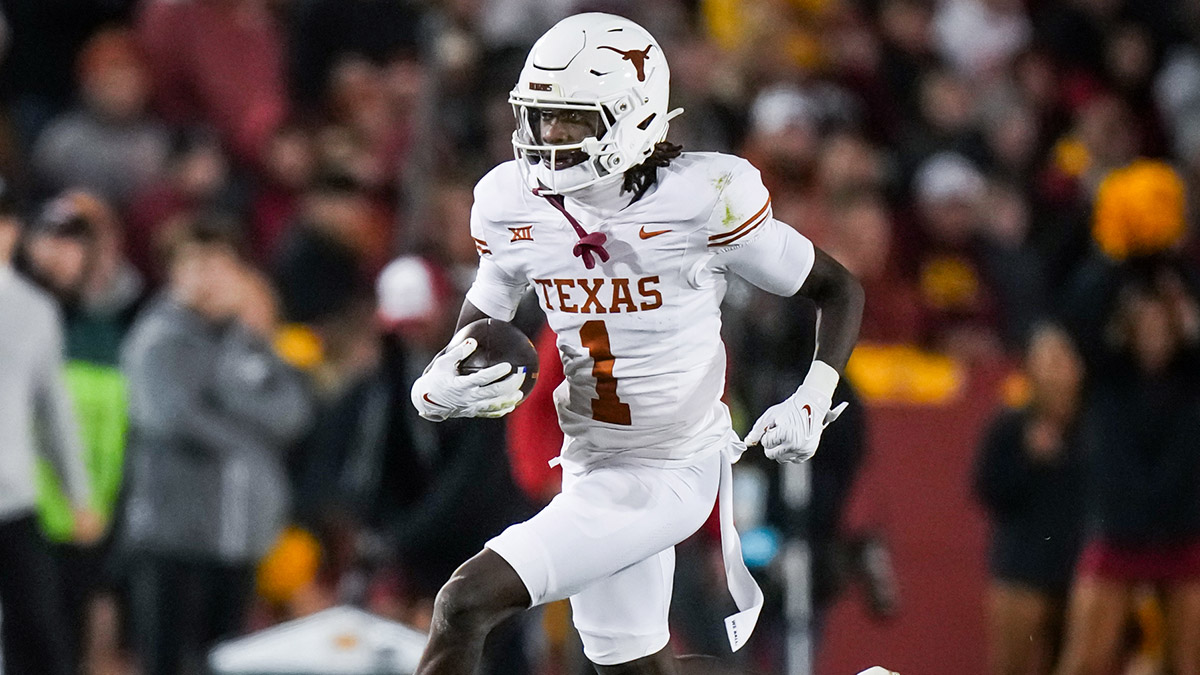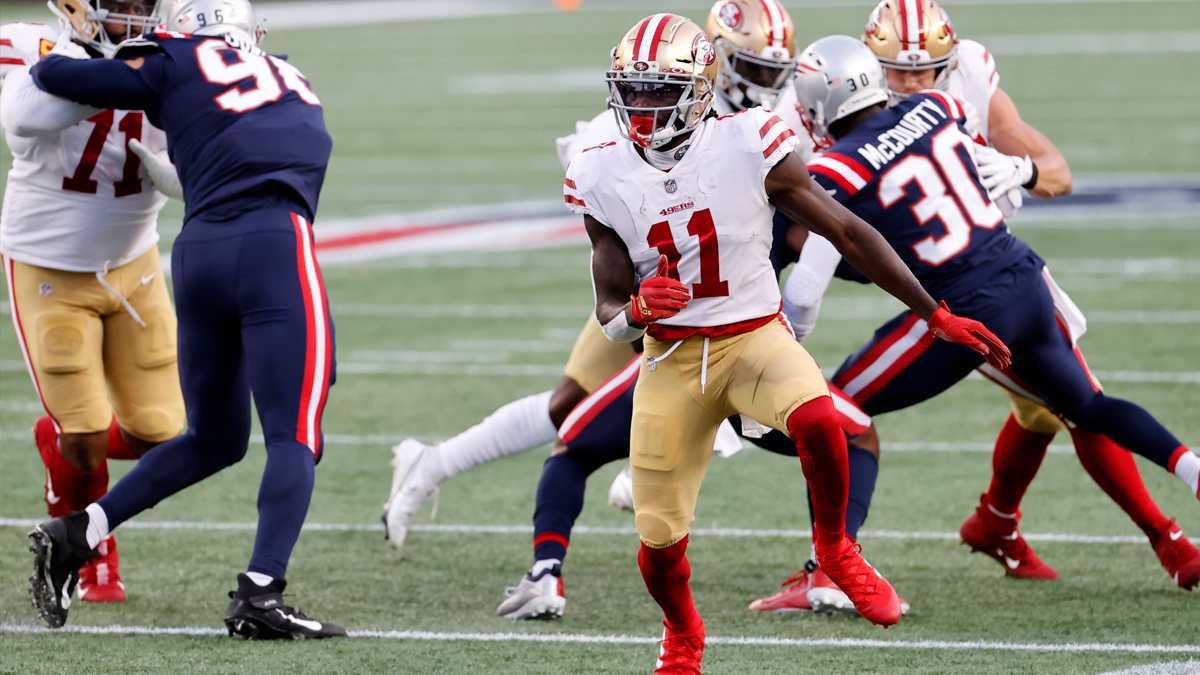
CAPITOLA -- Dwight Clark spent nearly two hours during lunch on Tuesday telling stories from his past that produced uproarious laughter from friends who joined him at a quaint restaurant just blocks from his home.
One day after celebrating his 61st birthday with a Big Mac, Clark was in vintage form at a spot in the center of the room. He shared one story after another. There were smiles and laughs all around. One of the attendees remarked that Clark has not changed a bit from the person he knew decades ago as a young man.
Finally, Clark turned serious and opened the door to the conversation about his new reality.
Stay in the game with the latest updates on your beloved Bay Area and California sports teams! Sign up here for our All Access Daily newsletter.
“Do you guys have any questions about the disease?” he asked.
Clark is living with amyotrophic lateral sclerosis, known as ALS, a progressive neurodegenerative disease. He went public with his diagnosis on March 19, 2017, after first experiencing symptoms, including loss of strength in his left hand, in September 2015.
“My neck is all messed up from football,” Clark said. “So I thought it was something pinching and I’d get it fixed and be fine. My 60th birthday was coming up. I thought, ‘I’ll take this year and get everything fixed.’ ”
He underwent an electromyography (EMG) to assess the health of his muscles and the nerve cells that control them. After the initial examination, Clark was asked to remain for another hour for additional tests.
San Francisco 49ers
“They sent me to a neurologist,” Clark said. “He named off about 10 things it could be and he said, ‘Have you ever heard of ALS?’”
“Yeah."
The doctor said, “There’s a chance it could be that.”
Now, he mostly gets around in a motorized wheelchair and estimates he might not be able to walk at all in three months.
“I’m just trying to get to 62,” he said,. “And, then, I’ll go from there.”
Clark caught 554 passes, including playoffs, over nine NFL seasons with the 49ers. He leaped into the air to make the most famous grab in franchise history, simply known as “The Catch,” to catapult the 49ers to their first Super Bowl title.
Clark acknowledged in the statement announcing his diagnosis that he suspects playing football caused the disease to strike him. He estimates he sustained five diagnosed concussions playing football, including three particularly serious blows to his head during his career with the 49ers.
But football remains a huge part of his life. He spoke optimistically about the 49ers with Jimmy Garoppolo. He even asked if anyone wanted to turn up the sound on the TV to listen to Jon Gruden’s introductory press conference with the Raiders.
Looking back and telling football stories – mostly the crazy stuff that happened off the field -- is great fun. He tries to avoid looking too far into the future.
“It’s depressing,” Clark said. “The future is scary as . . . I can’t imagine being totally paralyzed. I keep trying to reenact it – just lay there, and think, ‘I can’t get up.’ But I can’t do it for very long. It freaks me out.”
Soon, Clark sprinkles in more humor. There are more smiles and more laughs.
Clark appears at ease as he tells stories and makes everyone around him feel comfortable. The loud, upbeat conversation and good vibes emanating from the back of the restaurant spill into the main dining room, where unsuspecting patrons turn to look in curiosity.
Nearly every Tuesday since early October, Clark has met with important people from his past. Former 49ers staffers Kirk Reynolds and Fred Formosa have worked together on the lunch dates with a list of attendees that reads like a Who’s Who of 49ers.
One lunch included Eddie DeBartolo, Carmen Policy, Joe Montana, Jerry Rice, Roger Craig and Harris Barton. A week ago, Ronnie Lott, Tom Rathman, Derrick Deese, Ken Norton Jr., Garrison Hearst and Junior Bryant joined Clark. Steve Mariucci, Gary Plummer, Kevin Gogan, Keena Turner, John Taylor and Eric Wright are among the many others who have attended the lunches over the past three months.
Clark recently had lunch with a group of women with whom he worked while serving as an executive with the 49ers. Clark made lasting friends at every level of the organization.
“On Tuesdays, we come and tell lies about how good we were,” Clark said.
“It’s been awesome. Reminiscing is healthy. It’s been a fun time. A lot of stories I’ve forgotten about.”
Over a period of hours, it is easy for everyone to forget Clark’s condition and uncertain future. What helps make it special for Clark is that nobody treats him any differently.
“They come right in, man,” Clark said. “Nobody’s apprehensive.”
There are no filters. The stories are not censored. There is no sadness, no regrets.
“He’s dealing with a brutal disease that has changed the way he can physically move around,” Reynolds said. “We tell everyone who comes that these are not doom-and-gloom moments.
“He tells great stories and it’s all positive energy. Just to see him laugh and smile lifts everyone up in ways you can’t anticipate when you come. It’s been an uplifting and fun experience for everyone who comes.”
Clark received some encouraging news on a visit to his doctor on Monday. He goes every three months for checkups and examinations. It appears the degeneration from his disease has slowed. His doctor told him, “You’re a little bit weaker.” He is hoping the disease caps out.
Clark has a huge support system for which he is grateful. DeBartolo, the former team owner who is credited with building a family atmosphere that remains strong as ever, has spent countless hours researching and using his connections in the medical world to assist.
He went to Japan to bring back a three-month supply of Radicava to get a head start on treatment before it became available in the United States. In clinical trials, some people who took the drug experienced significant slowing of the decline normally associated with the disease.
At the time of his diagnosis, Clark weighed 242 pounds. His weight fell to 155.
“I was going to die because I was losing too much weight,” he said. “I have a feeding tube and that’s turned it around.”
Clark is up to 167 pounds with the goal of reaching 190. He has lost most of his appetite but is encouraged to act on all of his unique cravings, including mac and cheese, Blizzards and, yes, a Big Mac for his birthday.
Clark is certainly not a man who has been defeated. But there is no escaping the fact he has a disease with no cure.
“I’ll say to my wife, ‘I just can’t … believe I got this disease,’” Clark said. “Give me something I can fight. I can’t do anything. That’s what pisses me off. People get sick but you get a chance to fight. I’m still fighting it, but I don’t have the gloves on.”
Clark is preparing for a time when he will not be able to talk. His own voice and his most-used phrases can be banked and used in routine communication for when that day arrives.
“I’m waiting on the software, microphone and all of that,” Clark said. “I’ll go through all the words and record them.”
And will he preserve, in his own voice, some of his favorite curse words?
“Oh, (expletive deleted) yeah!”


